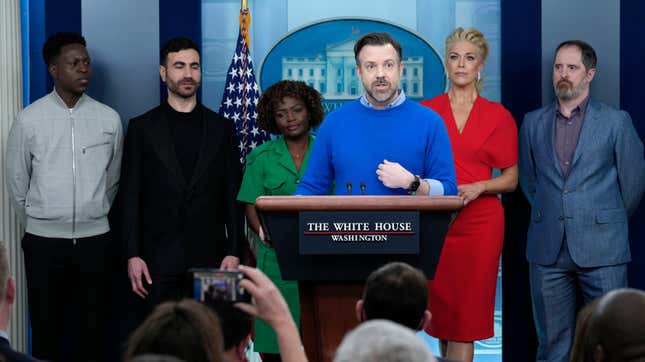We Don’t Need the ‘Ted Lasso’ Cast to Raise Our Awareness of Mental Health
When will we finally take the leap from celebs telling us to go to therapy, to actual policy change that addresses why so many people are struggling?
Biden AdministrationPolitics

I knew we were in for a cringefest when, on Sunday evening, President Biden’s Twitter account posted a photo of Ted Lasso’s iconic “BELIEVE” poster hanging above the doorway into the Oval Office. On Monday, I was sadly proven correct: The Ted Lasso cast, including creator and star Jason Sudeikis, Hannah Waddingham, Brett Goldstein, Toheeb Jimoh, and Cristo Fernandez, visited the White House to meet with Biden on “the importance of mental health” (whatever that even means, at this point), and deliver remarks on the issue before the press. I want to offer the disclaimer that I earnestly enjoy this show, and many of its cast members seem like truly delightful people. But, I have to ask: Was this really necessary, let alone especially beneficial to anyone at this point?
Mental health is a pretty central issue on Ted Lasso, as the titular, almost irritatingly positive protagonist, Ted, privately struggles with an anxiety disorder and childhood trauma, which he steadily begins confronting head-on in Season 2. A team therapist joins the cast and helpfully dispels a lot of myths about therapy. So, I can understand the underlying reasoning for the cast’s visit to speak on the topic. What I struggle to understand is how much more “awareness” about mental health crises—especially via celebrity spokespeople, profit-driven brands, or, say, TV shows—we could possibly need.
-

-

-

-

-

-

-

-

-

-

-

-

-

-

-

-

-

-

-

-

-

-

-

-

-

-

-

-

-

-

-

-

-

-

-

-

-

-

-

-








































